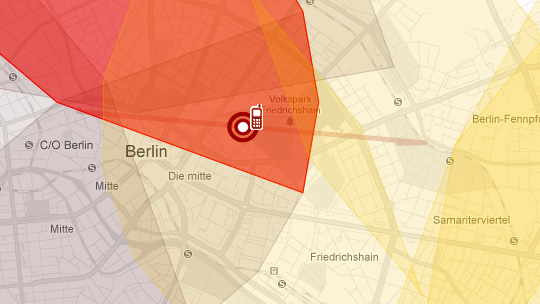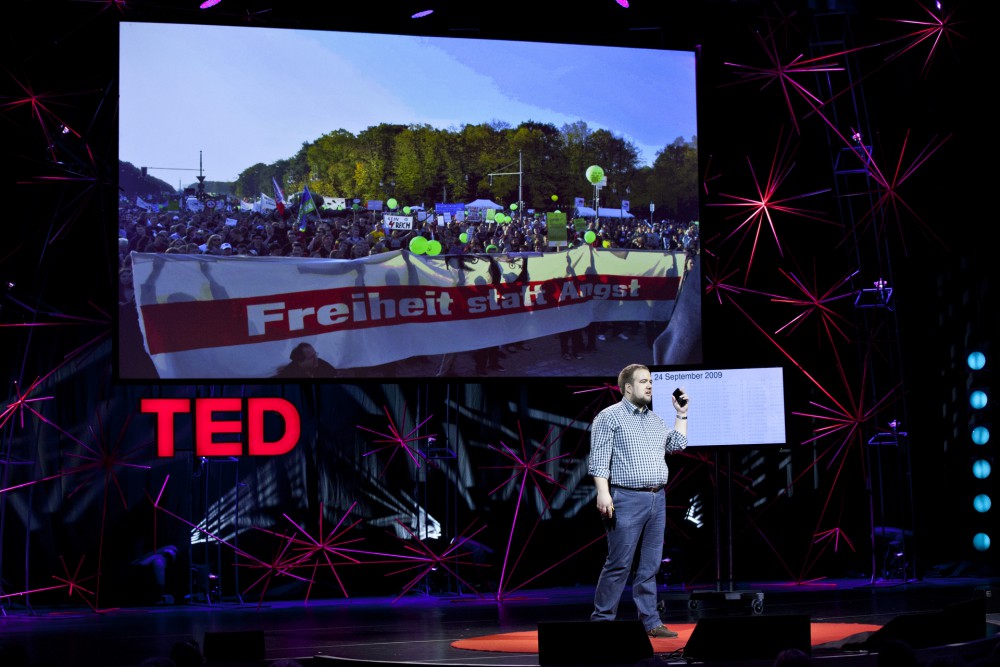After becoming a member of BÜNDNIS 90/DIE GRÜNEN in 2001, Malte Spitz has served as one of the six members of the Executive Committee of the German Greens, from 2006 till 2013. Since october 2013 he is member of the Federal Party Council of the German Greens. Currently, he works in Berlin and resides there with his wife and son. Previously a student of Economics at Humboldt-Universität Berlin, he is continuing his studies at FernUniversität Hagen by taking classes in the political and social sciences.
On April 14, 1984, Malte Spitz was born in Telgte, Nordrhein-Westfalen. As a young adult, he accumulated experiences that nourished his growing interest in politics. When he was younger, he would help distribute pamphlets and hang posters for the Greens with his mother, a member of the party since the 1980s. While he was in secondary school, or Realschule, he was elected as president of both his class and his school.
Additionally, he won several national accolades during his time at Realschule. He won a national competition in civic education (Politische Bildung) and, along with a friend, won a similar competition in German history. In 1999 Malte also won the fifth annual a national history competition, Geschichtswettbewerb des Bundespräsidenten, for his documentary on the protests against antisemitism in Telgte and Münsterland in the late 19th century. After finishing Realschule in 2000, he spent a year as an exchange student at a high school in Tomball, Texas. His experiences in the United States further motivated him to pursue a career in politics.
When he returned from his year abroad, he attended the Collegium Johanneum Schloss Loburg in order to complete his Abitur. During this time he worked as a freelance journalist. He helped found and develop schekker.de – a magazine for young adults sponsored by the German government. He also wrote for local newspapers and online publications. His work generally focused on the broad themes of culture, media and politics.
Malte Spitz started his political career in Münster. In 2002, he worked for a year as an online-journalist for the Grünen Jugend and the publication SPUNK. At the end of 2002, he founded an economic forum for the Grünen Jugend and actively participated in the Alliance 90/The Greens‘ national working groups for Culture; Economy and Finance; and Health, Labor, and Welfare. After Malte moved to Berlin for college in 2003, he was also elected to be an assistant in the national office of the Grünen Jugend.
At the end of the European Parliament election of 2004, he worked as the executive director of the Grünen Jugend until November 2006. During this time, the Grünen Jugend underwent several structural changes that caused an annual growth of 10-20%. He was also a member of the party’s political campaign staff for the 2005 federal election, where a number of his strategies and ideas were implemented. Then, he was offered a position by the party’s executive board to work with the New Member Development Commission and the Party Demographics Commission. Additionally, he helped develop the health policy of the Greens as a member of the working group for citizen health care (Bürgerversicherung).
Malte Spitz currently focuses on policy fields related to democracy, Europe, civil rights, the media, and the internet. He was for a couple of years the party’s first International Coordinator, where he aimed to support green parties and movements, such as the European Green Party and the Global Greens, as well as establish new alliances worldwide.
Outside of the party, Malte stays busy with other political alliances and initiatives. In regard to internet policy, he helped create the Fair-Sharing Campaign, which advocated the use of a cultural flat-rate as the new form of compensation for copyrighted works in the digital age. He has participated in a number of campaigns with a working group on data retention (AK Vorrat), such as the “Freiheit statt Angst” demonstration in Berlin. In spring 2010, he and politicians from all parties founded the group “Facebook – Privacy Control NOW!” in order to address the problem of data retention on social networks. In just a few short days, the group’s information page garnered the support of 75,000 people. Later that year, he and SPD politician Björn Böhning kicked off “Pro Netzneutralität,” a campaign that brought attention to the attempts to restrict net neutrality.
During his free time, Malte Spitz stays busy with various organizations and personal ventures. He participates as a member of the group “Erinnerung und Mahnung,” which he co-founded in 2001, and the Chaos Computer Club (CCC). He is also a member in Freundeskreis Telgte-Tomball, Freunde des Münsterlands, and Borussia Dortmund. In 2007, he was a speaker for the German National Committee for International Youth Work (DNK), a joint working group of the German Federal Youth Council (DBJR).
In 2009, Malte filed a suit against his cell phone provide, Deutsch Telekom, for the release of his digital data that had been gathered and kept. After the case was settled, he worked with Zeit Online to use this data to create an infographic that showed a detailed account of his movement over a span of several months. This graphic, build by Open DataCity, gained global attention and even appeared on the front page of the New York Times in March 2011. A year later, Malte Spitz became the first German politician who was invited to speak at TED Global. He described the fight for informational self-determination in the digital age. His talk has been translated into over 25 different languages and watched over one million times.


mr. spitz, i’m so glad there was a way to translate german to english because all i see is a jumble of letters when i look at the articles written in german. so thank you. i wanted to commend you and thank you for the article you wrote that appeared in the new york times in regard to obama and the PRISM revelation. of the many stories i have read on this subject, yours, by far, says it better than any other. i wish that there were some way to generate your piece so that it could be read by every american. like the germans, i, too, felt obama offered a fresh perspective and had some incredible ideas. i voted for him the first time. but in his run for re-election, i didn’t even bother to vote – i wasn’t keen on romney, either. and with this recent information coming to light, i am more concerned about the future than ever before for this great country of mine. anyway, i’m rambling. i just wanted you to know that you wrote so eloquently something i think is vital for as many americans to read as possible. you expressed for me what i think as well. the comparison to obama’s tactics today to what happened to your country in the distant and more recent past nails it exactly. i once worked as a writer and reporter at a small daily newspaper and had the opportunity to interview a couple of survivors of the holocaust. and while those interviews touched me deeply, it was a visit to the holocaust museum in d.c. that left me somber and contemplative for days afterward. again, thanks!! keep up the great work. deb saine, usa